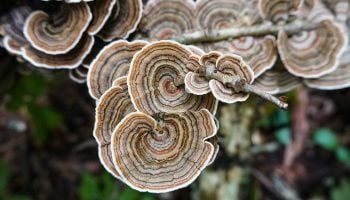SUMMARY
This case study explores the efficacy of clinical high-dose psychedelics for substance abuse. After reducing substance abuse, further high-dose experiences may help with social and wellness problems associated with long-term mental illness.
Brief background on case study
David* had become, in his words, a “profoundly sloppy drunk”. Alcohol was his way of self-medicating the scars of a past partner’s suicide and recent financial ruin that brought his business to near bankruptcy.
“I was depressed for the better part of five years,” he recalls. He tried various forms of therapy to alleviate his alcoholism and suicidal ideation, but with limited success. “Everything worked; nothing lasted.”
David also turned to psychiatric medications for help. He was prescribed Ritalin and Wellbutrin, to which he had no response even after dosage increases. Zoloft helped relieve some depressive symptoms, but overall there was “a strong blunting of my personality.”
The conventional treatment options had failed to treat David’s alcoholism and depression, and he found himself at a crossroads.
The experience of psilocybin-assisted treatment
David was familiar with psychedelics. Twenty-five years earlier, he had experienced profound thoughts on a high dose of LSD. The experience left a powerful impression on him—so much so that, over two decades later, he decided to enroll in a major university study of psilocybin for substance abuse. Psychedelics had helped him once before and perhaps they could help him again at this challenging point in his life.
David’s participation in a university-approved clinical study consisted of two preparatory sessions, followed by a single dosing session, wherein he experienced a high-dose psilocybin journey while under the care and supervision of two therapists.
“It was far more profoundly psychological than I was expecting,” David said.
During his psilocybin session, he experienced the surfacing of old wounds stemming from his childhood, including memories of sexual mistreatment and bullying. He also revisited profound grief surrounding a devastating romantic relationship at age 19, wherein the other person committed suicide after they broke up.
This major tragedy had contributed to David’s dependence on alcohol as a coping mechanism, as he “felt endlessly guilty for not preventing her suicide.” But, within a single session of psilocybin-assisted treatment, he recounted, “I released decades of grief.” He was finally able to view his role in the events through an objective lens and to extend some compassion toward himself—a perspective that he had previously struggled to adopt, despite many years of therapy.
David was struck by the immediate changes he witnessed within himself. “Are you serious?” he remembers thinking. “That fast?!”
Outcomes from macro-dosing vs. microdosing
Even though David felt he was no longer abusing alcohol after the initial therapy, he still had issues related to being an alcoholic for so long, especially in his personal relationships and his role as a father. He remembers how anti-social he had become and just was “not seeking out friends”.
Beyond avoiding social interactions, he found himself impatient with his children, especially being cooped up with them during the pandemic.
To repair his social and family relationships, he tried lower doses or “microdoses” of psilocybin.
While many people report the benefits of a psilocybin microdosing protocol, David did not feel it helped much.
So, he began a once weekly macro-dose regimen, often on Mondays.
Regular macro-doses helped David to operate from a less reactive viewpoint. Instead of getting swept away by intense emotion, he realized, “I can have a thought, and then it fades.” More and more, he noticed the thought or emotion without needing to act on it. Long-ingrained patterns were no longer automatic. There was a window of choice that wasn’t previously there. He began to adjust his behavior toward his children to act more in alignment with his values and less from a place of anger.
Microdosing was helpful in that it may have prevented some worse outcomes, but it was macro-dosing that facilitated the inner shifts that David needed to move forward with his life. “A sense of relief came from the threshold dose,” he said. The compounding effects of regular macro-doses cleared out subconscious blocks, reset his emotional operating system, and brought him to the deeper level of processing that he needed.
Significance of this case study
David’s story highlights the experimental nature of the psychedelic healing process. As written up in scientific studies, David’s case could be misconstrued as evidence that only a few treatments are sufficient to treat substance abuse. After all, David stopped drinking and checked all the boxes on official measurements.
The common saying that a single psychedelic journey can provide “ten years’ worth of therapy” must come with a caveat: Even in the best cases, psychedelic healing can take years to integrate fully. A magical overnight experience is often the first step in a long journey. Instead, the healing process may require continued engagement with the medicine, and a long-term integration process, to facilitate genuinely lasting change.
There is no one-size-fits-all approach, and the intensity and duration of treatment must align with each individual’s unique needs. For some, a couple of high-dose experiences, followed by occasional maintenance through microdosing regimens, might work best. For others, repeated high-dose experiences may be the most effective approach, depending on the depth of self-work that they are willing or wanting to do.
This case study suggests that, contrary to popular belief, psychedelic-assisted treatment may not be radically shorter than traditional pharmaceutical treatments. Continued maintenance doses may be necessary to solidify the positive effects that the initial psychedelic session made possible.
Additionally, David’s case shows the efficacy of pairing psychedelic treatment with appropriate therapeutic interventions, such as the self-compassion exercise. Such techniques seem to stick more when individuals are under the influence of a psychedelic, likely because the neuroplasticity-enhancing quality of these medicines makes individuals more receptive to new modalities and perspectives.
The importance of skilled psychedelic practitioners is highlighted in this case study. David’s transformative psilocybin experience in the clinical study was guided by a team of qualified therapists. Two preparation sessions preceded the actual dosing experience, which allowed David to embark on the journey from a place of intentionality and support.
During the psilocybin session, the clinical study therapist led David through a self-compassion exercise, in which he placed his hands over his chest and invited compassion into his heart. Before the treatment, he had tried this exercise and it had felt rote and ineffective. After the treatment, the exercise felt completely different—he actually accessed a physical quality of warmth and comfort.
*David is a pseudonym. Some quotes were edited for clarity.








